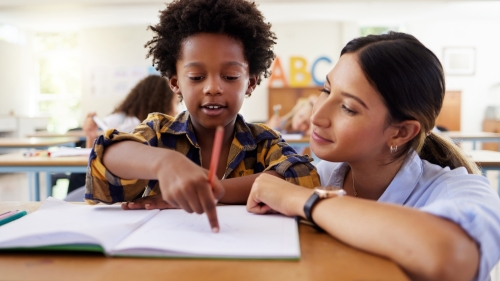
In a new study, Rachel Abenavoli, Ph.D., Jessica Siegel (Ph.D. candidate), Natalia Rojas, Ph.D., Pamela Morris-Perez, Ph.D., and Elise Cappella, Ph.D. partnered with the NYC Public Schools’ Division of Early Childhood Education (DECE) to examine professional learning (PL) experiences of New York City (NYC) early childhood educators during the COVID-19 pandemic (2020-2021). Through surveys and one-on-one interviews, the research team gathered broad and deep information about “outside-in” and “inside-out” PL experiences. “Outside-in” PL includes learning provided by external sources (e.g., group-based training series, individualized coaching), while “inside-out” PL describes support among colleagues (e.g., teacher-teacher interactions). Critically, the pandemic has exerted a significant impact on the nature of PL (e.g., the modality of PL shifted from in-person to virtual), calling for an urgent need to better understand early childhood educators’ professional learning experiences.
Key findings and policy recommendations from this study are summarized below:
- Inside-out PL among educators is particularly salient during the pandemic, and outside-in PL from external sources can stimulate and further support inside-out PL. While educators sought support from their peers more frequently than from external sources, learning delivered from an external source encouraged ongoing learning with colleagues. Policies that encourage integration between inside-out and outside-in PL would be useful (e.g., encouraging educators’ joint participation in virtual PL provided by external sources and time to discuss and reflect together).
- Teachers value support from instructional coordinators, social workers, and other coaches. Teachers were consistently positive about their experiences with individualized support from coaches. Those who did not have access to coaches in 2020-2021 reported feeling isolated and neglected. The coaching workforce can and does provide instructional and emotional support to educators, especially as they navigate the impacts of the pandemic on children, families, and themselves.
- Teachers are generally satisfied with the PL series provided by DECE, particularly with trauma-related PL. Teachers found the trauma-related PL series relevant and useful (e.g., it helped develop stronger empathy for the children and families they work with). Still, teachers reported receiving less support around their own mental health relative to other PL topic areas (e.g., instruction, children’s behavior, family engagement). Given that educators acknowledged their own experiences of heightened stress and trauma, it is recommended that policymakers continue to expand trauma-informed PL and offer PL around educators’ trauma and mental health.
- There are pros and cons of virtual (vs. in-person) PL. The shift to virtual PL offered advantages (e.g., the flexibility to learn at educators’ own pace and to rewatch videos) and disadvantages (e.g., less interactive). Hybrid opportunities that allow for interactive learning with peers (e.g., watching PL videos together in their workplace) would be a promising approach.
- There was no clear evidence of systematic inequities in PL experiences across Pre-K for All programs and teachers, at least in the data we collected and sample included in this study. However, given the pre-existing economic and racial inequities that contributed to the pandemic’s uneven burden across communities, it is critical to collect, analyze, and review information on an ongoing basis on PL experiences and the extent to which experiences vary across sites and educators.

Early childhood educators drew on a range of supports to carry out their work during the height of the pandemic—their colleagues, their coaches, and virtual professional learning sessions. Rather than ‘return to normal’ or scale back following this period, continuing to invest in effective inside-out and outside-in professional learning strategies--and strengthening alignment among these approaches--is a key way to support the educators caring for our city's youngest learners.
These findings shine a light on challenges to address and innovations to sustain and spread across NYC early childhood education programs. Read the full report at this link.
This project was supported by The New York City Early Childhood Research Network through funding provided by the Heising-Simons Foundation. In addition, it was a research-policy-partnership project with one of the Research Network’s policy partners – NYC Public School’s Division of Early Childhood Education (DECE).
The NYU research team includes Rachel Abenavoli (Ph.D.) Jessica Siegel (Ph.D. candidate), Natalia Rojas (Ph.D.), Pamela Morris-Perez (Ph.D.), and Elise Cappella (Ph.D.).
CONTACT INFO
Rachel Abenavoli, Ph.D.
Research Assistant Professor
New York University Steinhardt School of Culture, Education and Human development
196 Mercer St., Room 710
New York, NY 10012
212-998-5577
rma6@nyu.edu
Dona Anderson
Executive Director
NY Early Childhood Professional Development Institute
Co-Chair, NYS Early Childhood Advisory Council
16 Court Street, 31st Floor
Brooklyn, NY 11241
T: 718-254-7711
dona.anderson@cuny.edu



